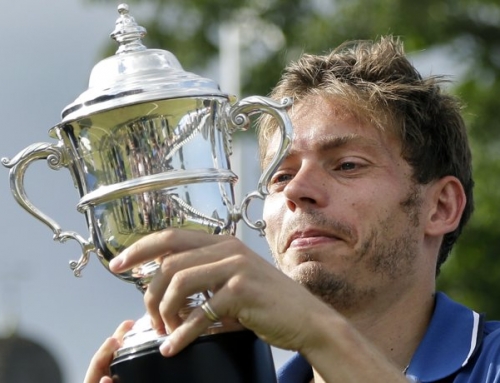 Tennis has had its share of fairy tales, players that come out of nowhere to win a title. Usually, these players are young, like Mats Wilander who claimed his first title at Roland Garros when he was 17, or Boris Becker claiming his second title at Wimbledon in 1985 after capturing his first at Queen’s mere weeks earlier.
Tennis has had its share of fairy tales, players that come out of nowhere to win a title. Usually, these players are young, like Mats Wilander who claimed his first title at Roland Garros when he was 17, or Boris Becker claiming his second title at Wimbledon in 1985 after capturing his first at Queen’s mere weeks earlier.
It’s a bit rarer when an older player does it. Mardy Fish was barely 26 when he made one of his better runs to a Masters 1000 final in 2008 at Indian Wells. Fish beat Florian Mayer, Igor Andreev, Nikolay Davydenko, Lleyton Hewitt, David Nalbandian, and Roger Federer before losing to Novak Djokovic in the finals. Admittedly, Fish had continuously played on tour and had reached a Master 1000 final early in his career, showing he had the potential to break through.
Brian Baker, aged 27, was one of those players that might have had a career in the pros. He had a very good junior career, but due to a number of surgeries, he was unable to compete, and so had taken a job as an assistant coach in Belmont, in Nashville, his hometown. Still, he harbored hopes that one day, his body would be healthy enough to let him do so.
Earlier on, I said Baker had been given one of the wildcards to the French Open by some clever French folks that were keeping up with his stellar performance in Nice. Turns out that’s not quite true. France, the US, and Australia enter into a deal each year where each of those Slams will award one wildcard to a player of that country and let the country decide how to pick the wildcard. Thus, the French Open would let the US decide one wildcard and let Australia decide the other. France would decide the remaining 6 wildcards.
Historically, there has been a tournament a few weeks prior to the Slam, usually about 8-men, and the winner of that would be given the wildcard. This time, they decided to pick the player that picked up the most points in Sarasota and Savannah, both US clay court events. That turned out to be Brian Baker, who won Savannah. From there, he went to Nice, played qualies, and made it to the finals.
One lesson you learn about Cinderella stories is that it’s rare that it ever ends so happily. Baker is ranked around 200. Perhaps if he were healthy, he might be a top 30 player, maybe even higher. But it’s a big ask to have him beat a player that is always ranked near 10 as Nicolas Almagro is. Almagro also thumped Gilles Simon in the semis, which is impressive given that Simon has fashioned himself to be a decent clay court player and was once in the top ten.
Having played so much tennis, and having a player the caliber of Almagro, Baker was unable to make much of a dent, and lost rather quickly, 63, 62 in the final.
Baker’s strengths appear to be his return of serve where he attacks more than most players, aiming for the lines. While many players seem inspired by Agassi or even Roger Federer, Baker’s strokes resemble Jim Courier with compact forehand and backhand, staying close to the baseline. The challenge for Brian Baker will be fatigue. He’s played for almost a month now.
The good news is that his draw is somewhat friendly. He doesn’t have to play a top seed right away. He opens with tour veteran, Xavier Malisse. While Baker could easily lose to Malisse, he’s beaten players that are ranked higher than Malisse. The following round could see him play the winner of Simon or fellow American, Ryan Harrison. Should he get past this round, Stan Wawrinka would be a likely opponent. So, it’s difficult, but a lot better than running into Nadal or Djokovic early on.
Baker will be joined at the French Open by Melanie Oudin who is the female wildcard entrant. Once touted as a potential top American, Oudin’s ranking slipped as she lost in first round after first round, unable to reclaim the magic that lead her deep in the US Open in 2009.
French Open play starts on Sunday.



![[Stockholm] Dimitrov wins first ATP title with 3-set victory over Ferrer](https://www.essentialtennis.com/wp-content/uploads/2013/10/20131021grigor-500x383.jpg)
![[Metz/St. Petersburg] Simon and Gulbis are champions!](https://www.essentialtennis.com/wp-content/uploads/2013/09/20130922gulbis-500x383.jpg)

